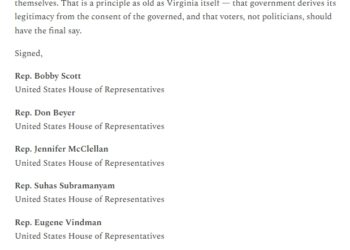
Statement on DPVA Chairmanship
When Dick Cranwell announced his resignation as DPVA Chair, I, like thousands of Virginia Democrats, celebrated his service-not just to the Party over the last several years, but to Virginians over several decades as a historic House Majority Leader.
A number of Democratic leaders from around the Commonwealth have recently told me they would like me to serve as our new Party Chair. Given the demands of my small business, I’m not sure this is the right time for me to fill the position. But the interest has been very flattering and has caused me to think deeply about our Party.
Brian Moran has been a friend for many years, and I believe would do a fine job as chair. Between November 3 and December 3, however, I hope the discussion will focus not only on who the Chair will be, but on what he or she will do. At this point, I thought it might be helpful to contribute a few specific ideas to help get the conversation started.
The Democratic Party has always been the party that helps regular people take on the systems that fail them. This is why we work for things like opportunity, justice, and reform every day in Virginia. And this is why I believe we are, by definition, the majority party. In my view, the DPVA needs to make this a reality on at least five fronts.
Policy and ideas: This year, I served on a DPVA task force that discussed how best to promote ideas within the Party. For decades, conservative activists have invested in an infrastructure of think tanks and academic centers that has helped them create the false impression that they are a party of ideas. I’m a strong proponent of a new effort to re-take the mantle of policy leadership, possibly by setting up an internal “boiler room” on policy and ideas. We could use new infrastructure to help candidates make particular issues their own and to create better separation from Republicans in the General Assembly on issues, including economic development, education, and building a clean economy.
Candidate recruitment: Parties are most successful when they recruit and train strong leaders. We have hundreds of community leaders across Virginia who are natural Democratic officials but who haven’t strongly considered running for office. Many emerging leaders will come up through local government-from council members to sheriffs-and they need to be fully included in the DPVA. Among others, they need fundraising training, organizing skills, and central support for research and staffing. We should have an assertive new push to recruit, train, and equip excellent candidates, especially in areas with weak or extremist Republican incumbents.
Small donors: Much of the vitality of political movements today stems from being able to excite the sort of donors-like Barack Obama’s-who repeatedly give small donations. These potential donors need to get committed to the cause of Virginia Democrats. The new DPVA Chair should work with staff and candidates to establish a new strategy for small donor development. Methods could include a new online infrastructure for donations, local DPVA activities, and communications specifically geared toward these donors.
A “war room” approach: Like it or not, momentum has shifted to the blogosphere and the 24 hour news cycle, which has been mastered by the Republican Party and its candidates. The DPVA needs to embrace the new environment. Every online communication should go to our central message, and we need to fully engage in persuasion and combat in the blogosphere. This will require an aggressive new “war-room” style; new communications infrastructure to drive 24/7 communications; and new outreach to blogs, bloggers, and social media.
Helping local committees: At its core, the DPVA stands on the shoulders of its hundred-plus local volunteer chairs. Some committees are extremely strong; others need help. I think we need a new, targeted approach to help weaker committees, essentially bringing a management consulting approach to the entire array of committees. This should include recruiting talented individuals to fill open chairmanships; setting quantifiable targets for recruitment and retention; promulgating best practices for management; and providing new chairs with better training.
These are only a few ideas, and there are doubtless many more. Whatever the DPVA does, it should meet a three-part test: it should be decisive, it should be measurable, and it should help Democrats win office. After November 2, I look forward to taking part in the conversation about how we can help this great Party re-take every possible majority in this great Commonwealth.
Thank you.
Mike Signer

![[UPDATED with Official Announcement] Audio: VA Del. Dan Helmer Says He’s Running for Congress in the Newly Drawn VA07, Has “the endorsement of 40 [House of Delegates] colleagues”](https://bluevirginia.us/wp-content/uploads/2026/02/helmermontage.jpg)
















